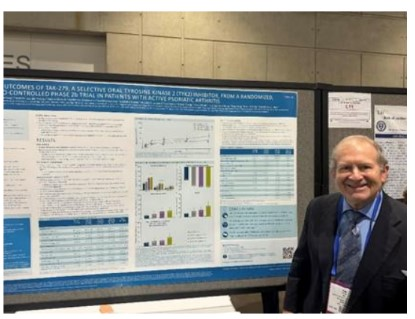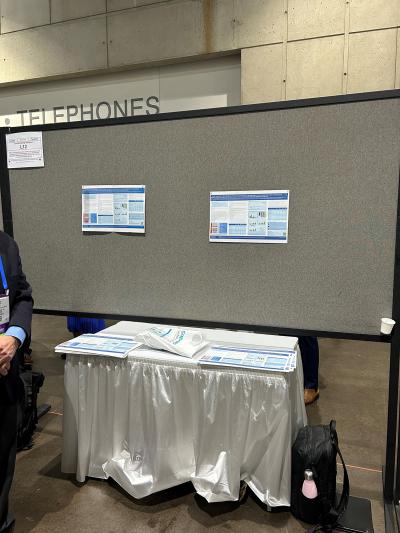Picture this: The show opens on a typical sunny day in San Diego at the American College of Rheumatology Convergence 2023. Attendees filter into the poster hall to see the latest and greatest in inflammatory medicine. They shuffle past posters touting breakthroughs in osteoarthritis, psoriatic arthritis, rheumatoid arthritis—all of the arthritides! The rather staid blue, white and beige posters belie the practice-changing information contained within.
But what attendees really want to see are Takeda’s late-breaking data from the phase 2b study of TAK-279 in active psoriatic arthritis. The rheumatologists push through the crowd, finding a suspicious murmur as they get closer. Finally, they break through to find ... nothing.
The poster is missing. The gray bulletin board is barren, but for a page advertising the code for what should be there: Takeda’s data.
Somewhere in Miami, David Caruso takes off his sunglasses and says, “It’s a biotech burglary.”
Cue The Who’s “Won’t Get Fooled Again.”
End scene.
At least, that’s how Fierce Biotech plans to write it for the blockbuster movie that is sure to come out from a peculiar incident at ACR this week. Takeda tells us that the TAK-279 data generated excitement when the poster mysteriously went missing from the late-breaker poster session.
The Japanese pharma says the poster wasn’t removed by its staff or any of the conference planners, who combed through 200 posters in the trash, to no avail.

They even checked the CCTV footage, but the angle was not good enough to find the culprit.
“The team was quite baffled by it and, after several hours of searching for it, gave up and had no choice but to laugh about it,” said Liana Goodwin, director of R&D communications for Takeda. “None of us has experienced anything like this before. Rather frustrating, but amusing at the same time.”
They still have no idea what happened to the poster. But, to accomplish what they went to ACR for, Takeda’s folks printed out a regular copy of the data and posted it on the bulletin board in the poster’s place. They also had the principal investigator, Alan Kivitz, M.D., president of the Altoona Arthritis & Osteoporosis Center and Altoona Center for Clinical Research, hand out printed copies for a time until a replacement was able to be printed.

So, what exactly made Takeda’s poster heist-worthy? The company reported that TAK-279 met the primary endpoint, with more than half of patients in either dose level achieving at least an American College of Rheumatology 20 (ACR 20) response, compared to just 29% on placebo. The ACR 20 is a measure of improvement in psoriatic arthritis suggesting a 20% improvement.
Patients in the 15 mg group had a 53.3% ACR 20 response at week 12, and the 30 mg group had a 54.2% response. On ACR 50, or a 50% improvement, the 15 mg group had a 26.7% response, and the 30 mg group saw a 26.4% response, compared to 9.7% on placebo. As for ACR 70, the results weren’t as strong, with the 15 mg group achieving 14.7% and the 30 mg group reaching 13.9%, compared to 5.6% on placebo, which Takeda called “numerically higher.” Safety was consistent with a previous phase 2b study.
The data will allow Takeda to push forward with a phase 3 program. A study for plaque psoriasis is expected to get underway before the end of this year, and a psoriatic arthritis test will follow next year.
If anyone has information on the whereabouts of the TAK-279 poster, Fierce Biotech is standing by to collect tips. We intend to work tirelessly—at least until the next news cycle, anyway—to crack this case.